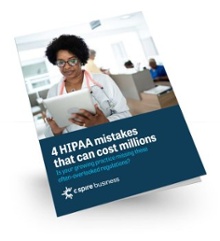
At its core, HIPAA ensures health organizations maintain patient confidentiality. The best way to do that? Technology.
Unfortunately, many small- to medium-sized organizations do not have the resources to support an in-house team of experts who can fully manage the intricacies of a company’s IT operations. Outsourced IT or managed service providers (MSPs) are one of the most cost-effective and efficient ways of leveraging technology to meet HIPAA standards.
Explore IT services from C Spire
What is an MSP?
An MSP is a third-party partner with a team of IT experts that offer a variety of technology services. They can be customized to fit a company’s needs and often include:
- Cloud solutions for storing electronic medical records (EMR) or data backups.
- Disaster recovery in case of a cyber-attack or a natural disaster like a hurricane or flood.
- Network infrastructure that configures and monitors firewalls, routers and switches.
- Voice and collaboration tools that enable seamless and secure remote work.
- Security services that include threat detection and 24/7 monitoring.
Managed IT and HIPAA
Beyond supplying the technical knowledge needed to help businesses meet their HIPAA regulations, a MSP can also help practices set up and manage strategic security controls that protect patient data. These controls can range from antivirus software to network firewalls to server access permissions. An experienced MSP will offer a full suite of cybersecurity services that can be customized to meet a practice’s vulnerabilities and concerns.
Another crucial piece to compliance is accurate and thorough documentation. If a healthcare organization suspects it has been compromised and does not have the logs and reports to prove unauthorized access to protected data did not occur, the organization may be obligated to let HIPAA officials know.
Here are two ways MSP documentation can improve compliance:
- Oftentimes, practices store their electronic medical record (EMR) software in a cloud server. In the face of a suspected security compromise, an experienced MSP will have established strict access controls and monitoring of the server so they can pull logs showing who did and did not interact with protected health information (PHI).
- When a team member falls for a phishing attempt, the practice needs to prove who did and did not gain access to the network where protected patient data is stored. Through its robust software, an MSP can provide that reporting, too.
Explore IT services from C Spire
GET THE GUIDE
4 HIPAA mistakes that can cost millions
Few things are more damaging to a growing healthcare practice than a HIPAA breach. Business and IT leaders can ease their worries and safeguard their practices by making sure they are meeting these four commonly overlooked HIPAA requirements



















